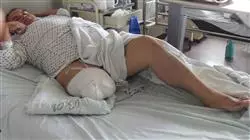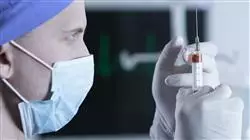University certificate
The world's largest faculty of nursing”
Introduction to the Program
The quality of care for people in internal medicine and infectious patients admission units is conditioned by the updating of the knowledge of the professionals who care for them. Get up to date on the nursing procedures and care that the professional must perform on infectious patients in the internal medicine service of hospital centers"

Within a healthcare context, social evolution requires care centers to be more competitive and oriented to improving the care response given to the patient. The volume of these changes and the speed with which they occur create a need for qualified professionals, trained in the right skills and who are capable of responding to the new changes by providing expert care.
Infectology has a very broad and innovative field of action. With the introduction of new technologies in the detection of pathologies, their attention and the necessary care for each process, the nursing professional is a key element in the multidisciplinary approach in each and every one of its aspects.
The Postgraduate diploma in Infectology Applied to Nursing is aimed at updating the nursing professional's knowledge, bringing theoretical knowledge closer to practical work. This is of vital importance the professional qualification in this area for all health professionals working within the Health System.
Through this Postgraduate diploma you will be able to update your knowledge in care for infectious patients, improve prognosis and reduce sequelae and complications"
This Postgraduate diploma in Infectology Applied to Nursing contains the most complete and up-to-date scientific program on the market. The most important features of the program include:
- Clinical cases presented by experts. The graphic, schematic, and eminently practical contents with which they are created provide scientific and practical information on the disciplines that are essential for professional practice
- Diagnostic and therapeutic innovations in treating patients with infectious diseases
- Presentation of practical workshops on diagnostic and therapeutic techniques most frequently performed in the internal medicine and infectious patients service
- Algorithm-based interactive learning system for decision-making in the presented clinical situations
- Theoretical lessons, questions to the expert, debate forums on controversial topics, and individual reflection assignments
- Content that is accessible from any fixed or portable device with an Internet connection
This course may be the best investment you can make when choosing a refresher program for two reasons: in addition to updating your knowledge on infectology, you will obtain a diploma from TECH Global University"
Its teaching staff includes nursing professionals of reference, who contribute their work experience to this up to date program, in addition to other professionals specializing in the internal medicine service.
The multimedia content developed with the latest educational technology will provide the professional with situated and contextual learning, i.e., a simulated environment that will provide immersive training program to train in real situations.
The design of the program is based on Problem-Based Learning, by means of which the nursing professional must try to solve the different professional practice situations that arise throughout the program. All this is supported by an innovative interactive video system developed by recognized experts in nursing care in the internal medicine service and with extensive teaching experience.
This program offers training in simulated environments, which provides an immersive learning experience designed to train for real-life situations"

It includes clinical cases to bring the program's degree as close as possible to the reality of care in Nursing"
Why study at TECH?
TECH is the world’s largest online university. With an impressive catalog of more than 14,000 university programs available in 11 languages, it is positioned as a leader in employability, with a 99% job placement rate. In addition, it relies on an enormous faculty of more than 6,000 professors of the highest international renown.

Study at the world's largest online university and guarantee your professional success. The future starts at TECH”
The world’s best online university according to FORBES
The prestigious Forbes magazine, specialized in business and finance, has highlighted TECH as “the world's best online university” This is what they have recently stated in an article in their digital edition in which they echo the success story of this institution, “thanks to the academic offer it provides, the selection of its teaching staff, and an innovative learning method aimed at educating the professionals of the future”
A revolutionary study method, a cutting-edge faculty and a practical focus: the key to TECH's success.
The most complete study plans on the university scene
TECH offers the most complete study plans on the university scene, with syllabuses that cover fundamental concepts and, at the same time, the main scientific advances in their specific scientific areas. In addition, these programs are continuously being updated to guarantee students the academic vanguard and the most in-demand professional skills. In this way, the university's qualifications provide its graduates with a significant advantage to propel their careers to success.
TECH offers the most comprehensive and intensive study plans on the current university scene.
A world-class teaching staff
TECH's teaching staff is made up of more than 6,000 professors with the highest international recognition. Professors, researchers and top executives of multinational companies, including Isaiah Covington, performance coach of the Boston Celtics; Magda Romanska, principal investigator at Harvard MetaLAB; Ignacio Wistumba, chairman of the department of translational molecular pathology at MD Anderson Cancer Center; and D.W. Pine, creative director of TIME magazine, among others.
Internationally renowned experts, specialized in different branches of Health, Technology, Communication and Business, form part of the TECH faculty.
A unique learning method
TECH is the first university to use Relearning in all its programs. It is the best online learning methodology, accredited with international teaching quality certifications, provided by prestigious educational agencies. In addition, this disruptive educational model is complemented with the “Case Method”, thereby setting up a unique online teaching strategy. Innovative teaching resources are also implemented, including detailed videos, infographics and interactive summaries.
TECH combines Relearning and the Case Method in all its university programs to guarantee excellent theoretical and practical learning, studying whenever and wherever you want.
The world's largest online university
TECH is the world’s largest online university. We are the largest educational institution, with the best and widest online educational catalog, one hundred percent online and covering the vast majority of areas of knowledge. We offer a large selection of our own degrees and accredited online undergraduate and postgraduate degrees. In total, more than 14,000 university degrees, in eleven different languages, make us the largest educational largest in the world.
TECH has the world's most extensive catalog of academic and official programs, available in more than 11 languages.
Google Premier Partner
The American technology giant has awarded TECH the Google Google Premier Partner badge. This award, which is only available to 3% of the world's companies, highlights the efficient, flexible and tailored experience that this university provides to students. The recognition as a Google Premier Partner not only accredits the maximum rigor, performance and investment in TECH's digital infrastructures, but also places this university as one of the world's leading technology companies.
Google has positioned TECH in the top 3% of the world's most important technology companies by awarding it its Google Premier Partner badge.
The official online university of the NBA
TECH is the official online university of the NBA. Thanks to our agreement with the biggest league in basketball, we offer our students exclusive university programs, as well as a wide variety of educational resources focused on the business of the league and other areas of the sports industry. Each program is made up of a uniquely designed syllabus and features exceptional guest hosts: professionals with a distinguished sports background who will offer their expertise on the most relevant topics.
TECH has been selected by the NBA, the world's top basketball league, as its official online university.
The top-rated university by its students
Students have positioned TECH as the world's top-rated university on the main review websites, with a highest rating of 4.9 out of 5, obtained from more than 1,000 reviews. These results consolidate TECH as the benchmark university institution at an international level, reflecting the excellence and positive impact of its educational model.” reflecting the excellence and positive impact of its educational model.”
TECH is the world’s top-rated university by its students.
Leaders in employability
TECH has managed to become the leading university in employability. 99% of its students obtain jobs in the academic field they have studied, within one year of completing any of the university's programs. A similar number achieve immediate career enhancement. All this thanks to a study methodology that bases its effectiveness on the acquisition of practical skills, which are absolutely necessary for professional development.
99% of TECH graduates find a job within a year of completing their studies.
Postgraduate Diploma in Infectology Applied to Nursing
.
Nowadays, knowledge in the field of infectious diseases is essential for nursing professionals who wish to provide quality and safe care to their patients. TECH Global University presents the Postgraduate Diploma in Infectology Applied to Nursing program, a unique opportunity to strengthen your skills and knowledge in this important area of healthcare. Our online classes offer you the flexibility to study from anywhere and at any time. Take advantage of the benefits of online education, where you can access up-to-date study materials, participate in interactive discussions with infectious disease experts and receive personalised feedback for your professional development.
Update your knowledge in infectious disease management
.
The Postgraduate Diploma in Infectious Diseases Applied to Nursing from TECH Global University will provide you with comprehensive training in the management of infectious diseases, from basic concepts to the latest research and advances in the field. You will learn to identify and evaluate risk factors, apply infection prevention and control measures, and collaborate in the implementation of management and treatment plans. Our program has a team of highly trained teachers committed to providing you with a quality educational experience. Through theoretical and practical classes, you will acquire the skills necessary to face the daily challenges presented by infectious diseases in the nursing environment. Stand out as an infectious disease nurse and contribute to the well-being of your patients. The demand for experts in this field is constantly growing and TECH Global University offers you the opportunity to acquire the knowledge and skills necessary to excel in your career. Don't miss this opportunity to specialise in infectious diseases applied to nursing: enrol in the Postgraduate Diploma in Infectology Applied to Nursing at TECH Global University and become a reference in the care and prevention of infectious diseases!







